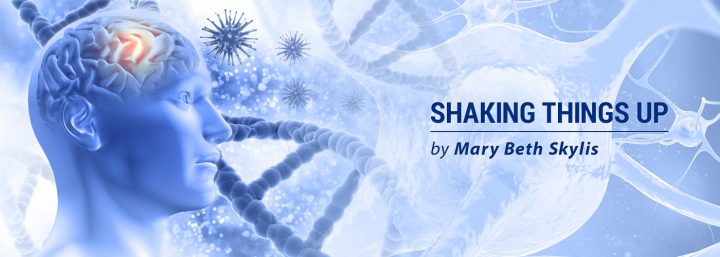Muhammad Ali’s Life and Parkinson’s Legacy
Written by |

Dad has always loved films about fighters.
There’s an allure to watching an underdog rise to fame. Maybe he’s mesmerized by the strength of characters like Rambo and Muhammad Ali because he hopes there’s a fighter in him as well. He won’t define himself by his circumstances or sink into indifference. Instead, he steps into the boxing ring, lifts his hands, and swears to fight his best fight.
Dad has taken a particular interest in Muhammad Ali, who was one of history’s most accomplished boxers. His legacy persisted, even when he was diagnosed with early-onset Parkinson’s disease. Maybe my dad sees himself in Ali, believing himself to be a literal and figurative fighter. Just like Ali, he fights Parkinson’s every day.
Stepping into the ring
Ali wasn’t just a fighter. He was witty, charming, and entertaining — the stuff of legends. After he won a gold medal in the 1960 Olympic Games at the age of 18, he continued his rise to fame by becoming the only three-time heavyweight world champion. He adopted a regal attitude when met with challenges, and he won the heart of America.
In 1971, Ali fought Joe Frazier in history’s greatest boxing match. Both men were undefeated when they stepped into the ring. After 15 heart-wrenching rounds, Frazier was victorious, but in 1974 and 1975, the men faced each other again.
Ali was named victor both times.
In reference to his battle with Frazier, Ali said, “I once read something that said, ‘He who is not courageous enough to take risks will accomplish nothing in life.’ Well, boxing is a risk and life is a gamble, and I got to take both.”
Ali and Parkinson’s
In the late 1970s, the public observed changes in Ali’s speed and speech. However, he wasn’t actually diagnosed with Parkinson’s until 1984 at the age of 42. The news came just three years after he formally retired from boxing.
It’s generally speculated that Ali’s boxing career was linked to his development of Parkinson’s. Wins turned to losses as his speed and agility suffered. By the time he took one of the greatest beatings of his life at the age of 38, the neurological symptoms were glaring. His speech was slurred and his hands were trembling visibly.
Philanthropy and activism
Ali’s life as a philanthropist was as mesmerizing as the grace he exhibited in the boxing ring. He dedicated himself to volunteer work and hoped to positively impact people who struggled.
Eventually, America’s hero established the multicultural Muhammad Ali Center, which includes a museum dedicated to Ali’s life and legacy. He hoped it would inspire others to “be as great as they can be.” To this day, the center develops programs that cultivate six principles: confidence, conviction, dedication, giving, respect, and spirituality.
Ali passed away from Parkinson’s-related complications in 2016 at the age of 74, but his mission lives on.
Ali’s impact on Parkinson’s
Heroes like Ali paved the way to understanding Parkinson’s by sharing their own experiences. A 2017 study found that Parkinson’s substantially impacted Ali’s speech, even before he was formally diagnosed. By studying the changes that Ali observed before his diagnosis, medical professionals can better understand the early symptoms of Parkinson’s.
There’s cause for speculation regarding Ali’s relationship with boxing. Would he have been diagnosed with Parkinson’s at age 42 had he stepped out of the boxing ring earlier? Is there a relationship between neurological disease and head injuries? If so, what can we learn from Ali’s experience with Parkinson’s?
No matter the answers, it’s clear that Ali played a significant role in the public’s growing interest in Parkinson’s.
We’re still captivated
I can’t help but wonder why we’re still captivated by Ali.
Perhaps we’re mesmerized by Ali’s poise throughout his Parkinson’s journey. He was a symbol of hope, showing other Parkinson’s patients that they don’t have to limit themselves. He lived for the journey and was determined to test his own limitations. He was unwilling to back down when he lost a match.
Whatever the reason for our continuing fascination, Ali’s tale of regality and triumph inspires generation after generation.
***
Note: Parkinson’s News Today is strictly a news and information website about the disease. It does not provide medical advice, diagnosis or treatment. This content is not intended to be a substitute for professional medical advice, diagnosis, or treatment. Always seek the advice of your physician or another qualified health provider with any questions you may have regarding a medical condition. Never disregard professional medical advice or delay in seeking it because of something you have read on this website. The opinions expressed in this column are not those of Parkinson’s News Today or its parent company, Bionews Services, and are intended to spark discussion about issues pertaining to Parkinson’s disease.






Ray Wesolowski
Muhammad Ali's Parkinson's disease was caused by vaccinations for"Rumble in the Jungle" 1974 (Zaire)!
Think about it. Name another boxer with it.
Aluminium is neurotoxic. Rwesol.wordpress.com/2017/01/14/Open-letter-Autism/ #2.63x
Narendra Thapar
I have been diagonised with Parkinsons.
Stage I
I want to help others in the same boat
Please tell me how?
Vikas Singh
My mother is also suffering from Parkinsons disease now she is 60 years. She has been diagnosed in 2018.
How can you help..?
Derek Foden
My Parkinson disease symptoms started at the age of 47. The fingers on my left hand were stiff and were difficult to move. People noticed that my walk was not normal. I was often asked if I was hurt. I noticed nothing different about my walk. It was difficult getting up from a chair and getting out of a car. I was diagnosed a year later ,it was the onset of tremors starting in my right hand that caused my other symptoms to be recognized as Parkinson's.. I am now 59. With the new herbal medicine for Parkinson I purchased from Multivitamincare . org was my only way to get rid of my PD,the herbal formula effectively reversed my condition and alleviated all my symptoms, people are suffering from this Parkinson disease due to lack of information.